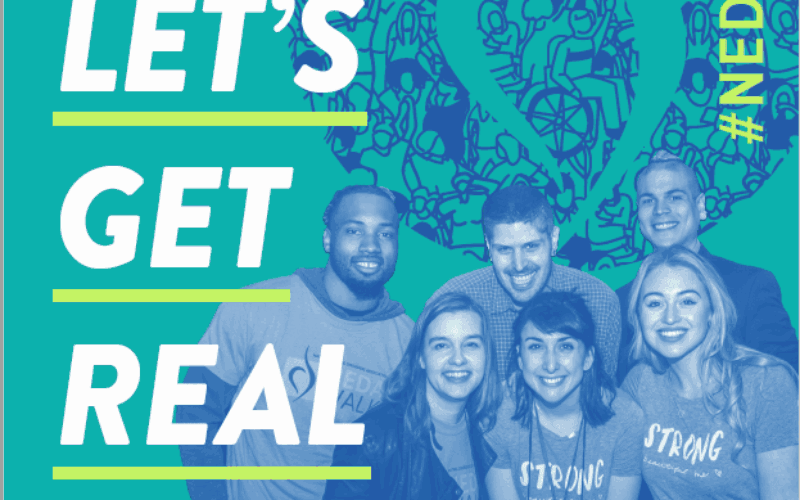This week is Eating Disorder Awareness Week in the United States and in the United Kingdom, and both NEDA (US National Eating Disorder Association) and Beat (UK’s leading nationwide charity supporting people affected by eating disorders) are running special campaigns between February 26th and March 4th.
NEDA’s theme this year is “Let’s Get Real” and the goal is to expand the conversation around this topic and highlight stories you don’t typically hear. According to the NEDA’s Website, “30 million Americans will struggle with a full-blown eating disorder and millions more will battle food and body image issues that have untold negative impacts on their lives.” With the goal of combating stigma and old stereotypes surrounding eating disorders and connecting people to the support that they need and deserve, NEDA offers a brief online screening tool (appropriate for ages 13 and up), comprehensive toolkit for parents, educators and coaches & athletic trainers, as well as general information and online support for those affected by eating disorders and their loved ones.
Beat will be posing the question “Why Wait?” as they campaign to raise awareness on eating disorders, and encourage and empower people to seek treatment that they need so that their chances for fast and full recovery will be maximized. While the message that early detection and intervention can save lives is a universal one, Beat aims to spread this important message in light of the fact that eating disorder sufferers in UK face an average wait of three and a half years for specialist treatment.
Whether you are from the US, UK, or any other English or non-English speaking countries, both themes will most likely be relevant to you and to those you care about. Eating disorders is a serious mental illness with significant medical and psychological complications that can affect ANYONE. This includes women, men, transgender people, people of color, older people, young children, people with disabilities, and people from every walk of life.
Eating disorders can be difficult to recognize. The key to treating eating disorders is to notice signs such as:
- lack of appetite, or interest in food
- dramatic weight loss
- upset stomach
- gastrointestinal issues with no known cause
- progressive “picky eating”
Common eating disorders include:
- Anorexia nervosa: Extreme restriction of food intake due to intense fear of weight gain.
- Bulimia nervosa: Cycles of binge eating followed by purging to avoid weight gain.
- Binge-eating disorder: Repeated episodes of consuming large quantities of food without purging.
- Avoidant/restrictive food intake disorder (ARFID): Limited eating due to sensitivities or fear of adverse effects such as choking.
Myths and facts surrounding eating disorders:
Myth: Eating disorders are a choice.
Fact: They are serious mental health conditions influenced by biological, psychological, and social factors.
Myth: Only women are affected.
Fact: Eating disorders impact all genders, ages, and body types.
Myth: You can tell by someone’s weight.
Fact: They can affect people of any size.
Myth: It’s just about food.
Fact: They often stem from deeper issues like trauma, anxiety, or societal pressures.
Eating disorders can affect people of any age, and it’s important to be aware of the misconceptions and biases surrounding them. By sharing accurate information, we can reduce stigma, which might help those affected in seeking professional assistance. Any professional help from therapists, dietitians, and medical professionals specializing in EDs should be encouraged, since eating disorders are dangerous and even deadly, but highly treatable, especially with early detection.
Links to works consulted:
https://www.mayoclinic.org/diseases-conditions/eating-disorders/symptoms-causes/syc-20353603
https://www.healthline.com/nutrition/common-eating-disorders#anorexia

